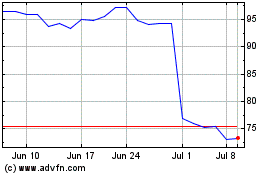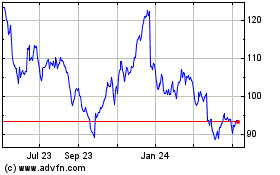By Sara Germano and Joshua Robinson
Nike-backed running coach Alberto Salazar on numerous occasions
briefed top Nike Inc. officials, including chief executive Mark
Parker, on his experiments to manipulate the use of
performance-enhancing drugs for track and field athletes, according
to emails referenced in reports published by the U.S. Anti-Doping
Agency on Monday.
The reports, prepared by the American Arbitration Association
for USADA, delivered respective four-year bans for Mr. Salazar and
a Nike-sponsored doctor, Jeffrey S. Brown. Together they show that
Mr. Parker was made aware of Mr. Salazar and Dr. Brown's ongoing
work in what USADA described as "orchestrating and facilitating
prohibited doping conduct."
The reports also allege that at least one of the pair's
experiments -- determining whether the use of topical testosterone
cream would trigger a positive doping test -- was conducted in a
laboratory at Nike's headquarters.
Mr. Parker was included on several emails from Mr. Salazar and
Dr. Brown, detailing the pair's ongoing research to find
performance-enhancing benefits for a stable of Olympic runners in
the highly decorated Nike Oregon Project, an elite training group
based at the company's Beaverton, Ore., headquarters.
In a July 2009 email exchange, Dr. Brown wrote to Mr. Parker to
apprise the Nike chief on the testosterone experiment, in which he
relayed testing varying amounts of hormonal creams on Mr. Salazar's
adult sons, who aren't professional athletes.
"We tested levels in the commonly used screening at least for
track and field of urinary T/E (testosterone/epitestosterone)
ratios after 1 pump (1.25 grams) and 2 pumps (2.5 grams) of
Androgel," Dr. Brown wrote, according to the report on his
sanction, referencing the brand of testosterone cream used. "We
found that even though there was a slight rise in T/E ratios, it
was below the level of 4 which would trigger great concern."
Mr. Parker responded, "Jeff, thanks for the update on the tests.
It will be interesting to determine the minimal amount of topical
male hormone required to create a positive test. Are there other
topical hormones that would create more dramatic results...or other
substances that would accelerate the rate of absorption into the
body?"
Testosterone is a substance banned by the World Anti-Doping
Agency, the global antidoping authority whose codified rules are
adopted by the U.S. Anti-Doping Agency, the International Olympic
Committee, and various other national and international sports
organizations.
According to the reports, Mr. Salazar and Dr. Brown devised the
testosterone experiment after Mr. Salazar became increasingly
concerned that his athletes could be victims of sabotage by
competitors. Galen Rupp, the American distance runner, testified to
the arbitration panel that he felt a trainer come up to him at a
May 2009 track meet and proceed to "rub something wet on his
back."
USADA argues that "this same experiment can be used to further
the nefarious purpose of evading doping control just as easily as
it can be used for the claimed prophylactic purpose of determining
the likely success of attempted sabotage."
In a separate 2011 exchange, Mr. Salazar directly informed Mr.
Parker, as well as Nike's president of advanced innovation Tom
Clarke and the disgraced former cyclist Lance Armstrong, of the
results of another experiment with a supplement called L-Carnitine
believed to improve aerobic performance. L-carnitine is a chemical
compound which, while not a prohibited substance, is subject to
WADA rules restricting the methods by which it can be administered
and in what quantities. It wasn't clear if Mr. Parker or Mr. Clarke
responded to the message.
At the time, Mr. Armstrong had retired from cycling under a
cloud of suspicion, but continued to train at an elite level in
triathlon, sponsored by Nike and advised by Mr. Salazar. Mr.
Armstrong was banned by USADA in 2012 and publicly admitted to
doping in 2013.
In a December 2011 email, Mr. Salazar wrote to Mr. Armstrong
directly, "Lance, call me asap! We have tested it and it's
amazing!," according to one of the reports. He continued, "It's too
incredible. All completely legal and natural. You will finish the
Iron Man in about 16 minutes less while taking this." Mr. Armstrong
said in an email Tuesday that he never tested or tried
L-carnitine.
Nike on Tuesday didn't have immediate comment on the emails
included in the reports. In a statement about the USADA action late
Monday, Nike said: "We support Alberto in his decision to appeal
and wish him the full measure of due process that the rules
require. Nike does not condone the use of banned substances in any
manner."
In a statement late Monday, Mr. Salazar said that he was
"shocked" by the ban and that he planned to appeal. "I have always
ensured the [World Anti-Doping] code is strictly followed. The
Oregon Project has never and will never permit doping," he
said.
A receptionist at Dr. Brown's medical office in Houston said he
wasn't immediately available early Tuesday. The endocrinologist
stopped consulting for Nike in 2013, according to the reports.
Mr. Salazar's Nike Oregon Project has produced six Olympic
medals between distance running stars Mo Farah of Great Britain and
Rupp of the United States. The decision to ban Mr. Salazar and Dr.
Brown is Usada's highest-profile sanction since it banned Mr.
Armstrong for life in 2012.
A spokesman for both Mr. Farah and Mr. Rupp didn't immediately
respond to a request for comment Tuesday.
The bans were announced at the height of track and field's most
prominent competition outside of the Olympics, the biennial World
Athletics Championships this week in Doha, Qatar, where at least
seven athletes affiliated with the Nike Oregon Project are
scheduled to compete. Within hours of the announcement, Mr.
Salazar's pass to the stadium was rescinded, according to track and
field's world governing body.
Mr. Salazar, himself a former elite runner and a Boston and New
York City Marathon champion, is a close friend of Nike co-founder
Phil Knight, both of whom are alumni of the track and field program
at the University of Oregon. Mr. Salazar is so esteemed at Nike
that one of the company's buildings at its Beaverton, Ore., campus
is named for him.
Write to Sara Germano at sara.germano@wsj.com and Joshua
Robinson at joshua.robinson@wsj.com
(END) Dow Jones Newswires
October 01, 2019 13:06 ET (17:06 GMT)
Copyright (c) 2019 Dow Jones & Company, Inc.
Nike (NYSE:NKE)
Historical Stock Chart
From Mar 2024 to Apr 2024

Nike (NYSE:NKE)
Historical Stock Chart
From Apr 2023 to Apr 2024
